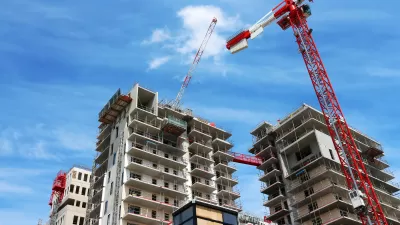As mortgage rates creep higher and builders continue to experience supply bottlenecks, the future of the housing market remains uncertain.

Anticipating rising mortgage rates prompted by the Federal Reserve, Conor Sen argues that “any slowdown that does materialize won’t affect the industry equally because it isn’t going to be about fundamental problems with the housing market. Rather, it will be the result of the Federal Reserve intentionally increasing borrowing costs to cool off inflation.”
According to Sen, “Any negative impact of rising mortgage rates would be felt disproportionately where affordability problems already are the worst — high-cost coastal markets — and then in materials for the early part of the construction cycle, such as lumber.”
Unlike during previous downturns, “For now, at least, there is no broad industry downturn as we’ve seen before in oil and gas or the technology sector that would lead to the housing market suffering in places like Houston or the San Francisco Bay Area.” Rather, Sen writes, “What we’re seeing instead is that the surge in mortgage rates engineered by the Fed is adding to affordability problems. So it stands to reason that the places most affected will be metro areas that were already the least affordable.”
Additionally, “There also is the post-pandemic migration dynamic of high-income households moving from high-cost to lower-cost areas.”
To Sen, the future of the housing market is unclear as mortgage rates climb in a still overheated market. “If there is any upside for buyers in the current market, it’s that because the affordability problems created by rising mortgage rates are intentional on the Fed’s part, they can always reverse those increases if it turns out they’ve overdone it to the point it threatens the economy.”
FULL STORY: Don’t Count On a Housing Slowdown to Improve Affordability

Alabama: Trump Terminates Settlements for Black Communities Harmed By Raw Sewage
Trump deemed the landmark civil rights agreement “illegal DEI and environmental justice policy.”

Planetizen Federal Action Tracker
A weekly monitor of how Trump’s orders and actions are impacting planners and planning in America.

The 120 Year Old Tiny Home Villages That Sheltered San Francisco’s Earthquake Refugees
More than a century ago, San Francisco mobilized to house thousands of residents displaced by the 1906 earthquake. Could their strategy offer a model for the present?

Ken Jennings Launches Transit Web Series
The Jeopardy champ wants you to ride public transit.

BLM To Rescind Public Lands Rule
The change will downgrade conservation, once again putting federal land at risk for mining and other extractive uses.

Indy Neighborhood Group Builds Temporary Multi-Use Path
Community members, aided in part by funding from the city, repurposed a vehicle lane to create a protected bike and pedestrian path for the summer season.
Urban Design for Planners 1: Software Tools
This six-course series explores essential urban design concepts using open source software and equips planners with the tools they need to participate fully in the urban design process.
Planning for Universal Design
Learn the tools for implementing Universal Design in planning regulations.
Clanton & Associates, Inc.
Jessamine County Fiscal Court
Institute for Housing and Urban Development Studies (IHS)
City of Grandview
Harvard GSD Executive Education
Toledo-Lucas County Plan Commissions
Salt Lake City
NYU Wagner Graduate School of Public Service





























